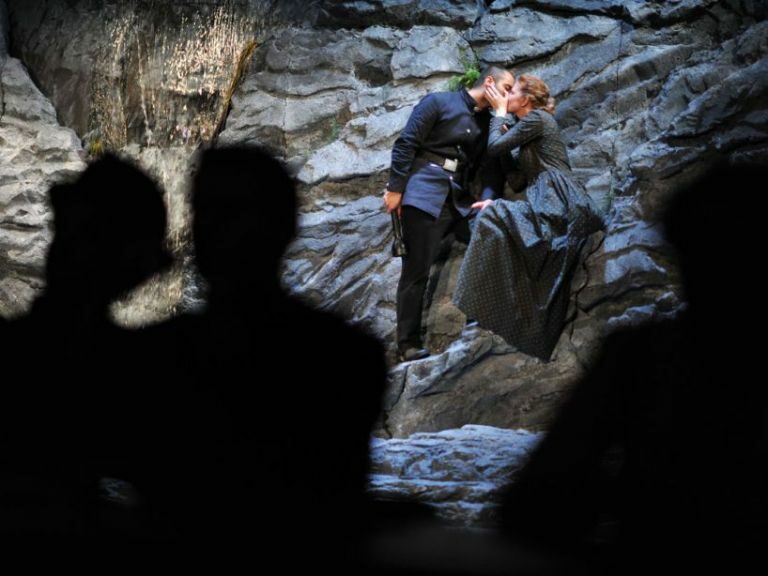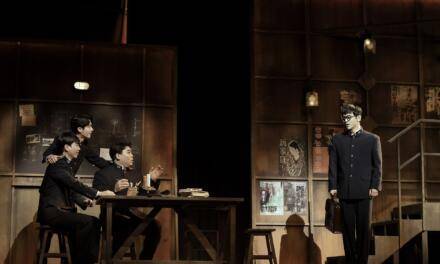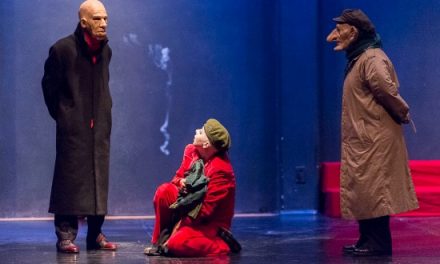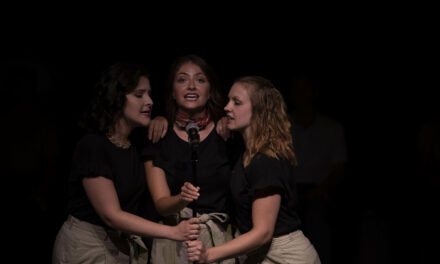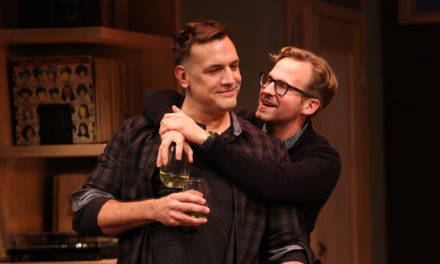I don’t actually like Woyzeck very much, so I am not sure why I bought tickets to two different productions in the space of a few weeks. And they seem to be backward: the usually more restrained Kammerspiele went a little crazy, and the usually too-Regietheater-even-for-me Volkstheater delivered a surprisingly traditional production.
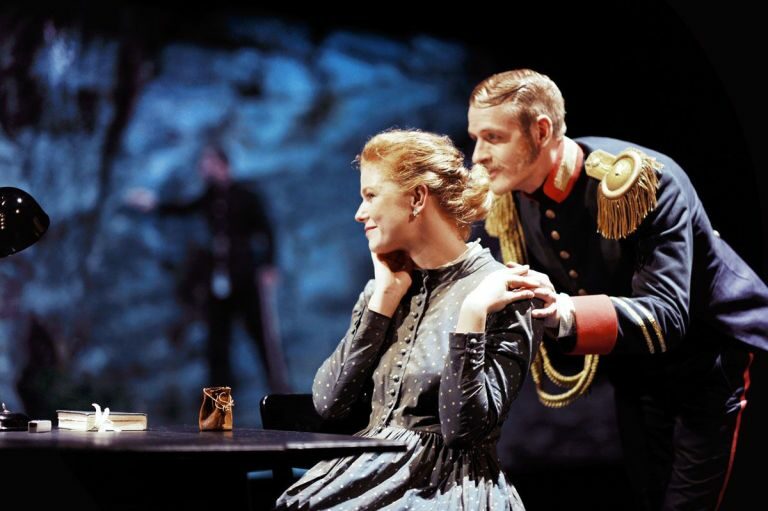
Marie (Magdalena Wiedenhofer) and the Drum Major (Jakob Geßner). Photo: Arno Declair.
Now, this is still Germany, so don’t over-interpret “traditional.” Director Abdullah Kenan Karaca has chosen period costumes and a gorgeous waterfall setting for the outdoor scenes, but that doesn’t mean this is Woyzeck as Büchner would have seen it. No, this is something better. The waterfall is one of three settings, along with the soldiers’ table full of wine and Marie’s dressing room. All exist and are occupied simultaneously—no set pieces leave the stage, and neither do any actors. This keeps the drama moving quickly and also makes some of the action far more disturbing: for instance, the drum major rapes Marie at the waterfall in the background as the soldiers humiliate Woyzeck in the foreground. Neither Marie nor Woyzeck is ever safe from the degrading and dangerous influences of the other characters because they are never more than a few steps away.
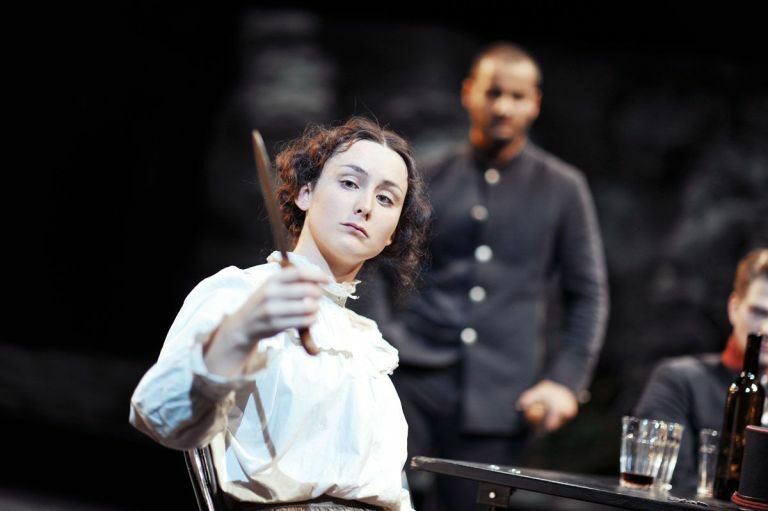
Margret (Lenja Schultze). Photo: Arno Declair.
I was ambivalent about Sohel Altan G.’s Woyzeck, who definitely comes across as interesting and psychologically unstable but whom I found it hard to understand or empathize with. He seems so isolated and hopeless from the second scene onwards that it is hard to see and pity any sort of downward spiral. That said, he gets mad credit for licking wine mixed with spit off the stage. I don’t think you could ever pay me enough to do that. As the drum major, Jakob Geßner initially displays a sort of exaggerated goofiness that got on my nerves. But that makes the contrast when he begins abusing and assaulting Marie very striking, so in retrospect, it works. I never want to encounter Silas Breiding’s quietly sadistic captain, and Pascal Fligg’s doctor is almost as scary in his clinical detachment.
But it is really the actresses who make this Woyzeck great. I’ve now seen Magdalena Wiedenhofer in three shows in a row, and she’s been among my favorite performers each time. She’s also astonishingly unrecognizable in her different roles—if not for the Bezetzungszettel, I probably wouldn’t have realized that she also played Polly Peachum and Hermione. Her heart-wrenching downtrodden Marie, bouncing back and forth between two emotionally and physically abusive men, is a masterpiece. Lenja Schultze also shines as Margret, especially when she sells Woyzeck her knife with a glib “thou shalt not murder” and an utterly terrifying smile.
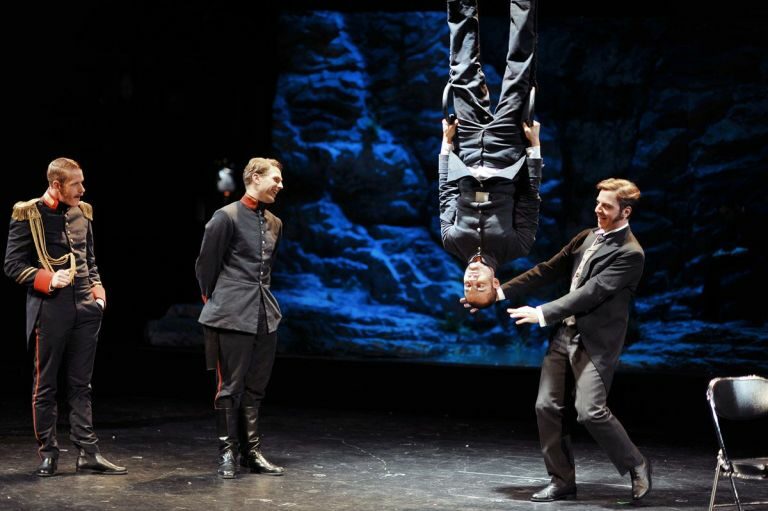
Photo: Arno Declair.
One of my disappointments at the Kammerspiele was that the audience didn’t get to see the ending play out onstage. This production more than makes up for that. Woyzeck’s repeated stabbing of Marie is shocking and brutal, but it is hard to blame him. This staging is far more in accordance with the interpretation of the play as a “working class tragedy” than as a “tragedy of jealousy” (especially as it is clear to both the audience and to Woyzeck that what happened between the drum major and Marie was rape). The drum major, captain, and doctor, smoking and drinking uncaringly at their table while Marie dies, are clearly the real villains. They pushed their lab subject Woyzeck until he murdered, and then clinically recorded the results.
This review originally appeared in My German Season on January 13, 2015, and has been reposted with permission.
This post was written by the author in their personal capacity.The opinions expressed in this article are the author’s own and do not reflect the view of The Theatre Times, their staff or collaborators.
This post was written by Ilana Walder-Biesanz.
The views expressed here belong to the author and do not necessarily reflect our views and opinions.

